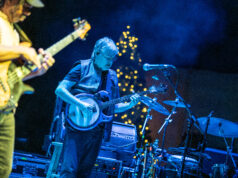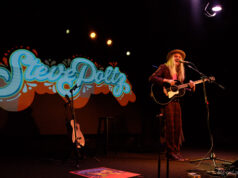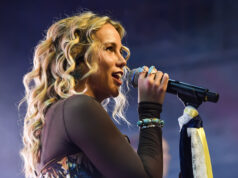Rayland Baxter (Photo courtesy Red Light Management)
Second-generation musician Rayland Baxter had a band booked to open for him recently at The Hamilton Live in DC, where he was touring behind his new album, If I Were A Butterfly. However, the drummer’s wife went into labor, so, naturally, he went to be with her, and the band without a drummer, bowed out of the gig.
Instead, Rayland opened the show himself with a solo acoustic set.
Before he settled into the songs at The Hamilton Live on Nov. 19, Rayland spoke at some length about the last few years. When the Covid pandemic shut things down, he had just left the converted rubber band factory that was serving as his studio, having mostly finished recording his latest LP. He moved to the studio, in Kentucky, in late 2019, and wrote over 100 songs in the next few months. But when he left in March, he wasn’t quite finished, and he spent the lockdown period reworking much of the material. That process of making “a record with no time limit,” he said, “took 10 years off my life.”
It’s been a rough period for Baxter. The studio was created as a sort of a memorial to two close friends who passed away in 2018. In May 2020, his father, Bucky, passed away. His father came by that nickname because, in the ’70s, “he had a giant Afro and everyone called him ‘Buckwheat.'” (The new LP contains the song “Buckwheat.”) A master of the pedal steel guitar, Bucky played with Bob Dylan and Steve Earle. An interesting comparison for Baxter is Patterson Hood of the Drive-By Truckers, another singer-songwriter whose father, bassist David Hood, played in the Muscle Shoals Rhythm Section. Both Hood and Baxter have been characterized as inhabiting a space between alt-country and rock.
Watch Rayland Baxter perform “Rubberband Man” and “Buckwheat” live for Lightning 100 on YouTube:
Since he lost his father, Rayland has found comfort in being visited by him in dreams. Rayland is an interesting character; he’s a mystic and a poet, but he didn’t originally plan to pursue music. He left the University of Maryland, where he played on the lacrosse team, 2 credits short of graduation. You can tell he was an athlete by looking at him; he has a tall, long frame, and he seems to keep himself in fairly good shape.
Rayland’s opening solo set consisted of older material, beginning with “The Mountain Song.” During the next song, “Olivia,” he stopped playing his guitar and continued to sing a capella while the audience snapped their fingers in rhythm. Between songs, he said “I get to be on the edge, too. You all don’t know what’s coming, and neither do I.”
He continued with “Willy’s Song” and “Freakin’ Me Out.” “These songs began in a bedroom somewhere,” he said, and he welcomed requests from the crowd. Someone asked for “Strange American Dream” — he said was planning to play it with the full band, but he did solo too, to show the difference between the two versions.
After “Mother, Mother” he brought out Barney Cortes from his band, introducing him as a singer-songwriter in his own right. Barney is a resident of Philadelphia, about which he composted “Shit River.” Rayland and Barney sang it together, then left the stage for an intermission before the full band came out.
The full band set, as Rayland had promised, featured new material, beginning with “If I Were A Butterfly.” He also performed “Billy Goat,” “Rubberband Man,” and “Graffiti Street.” For “Good Friend,” his girlfriend joined on stage in a duet. He covered Mac Miller’s “Small Words,” and other songs included “Mr. Rodriguez,” “Angeline,” “Yellow Eyes,” “Amelia Baker,” “Sandra Monica,” and “Hey Larocco.” Introducing “Bad Things,” he said, “We’ve all done some bad things.” Amen, brother. The show concluded with “Casanova.”
There was a nice contrast here between the intimacy of the opening solo acoustic set and the louder, fuller band. Both ways, the craftsmanship of Baxter’s songs was undeniable, and there was a lot of heart and soul expressed throughout the evening.






